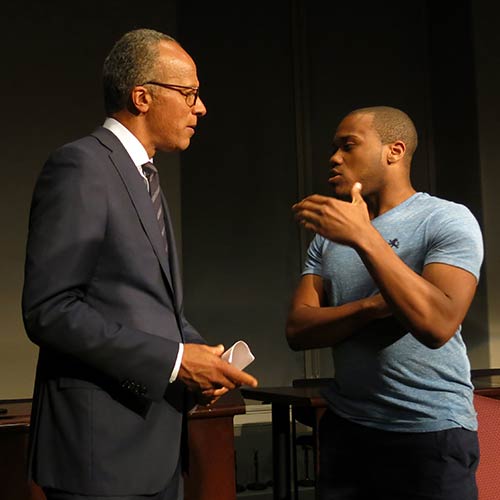Sign up for the daily CJR newsletter.
NBC Nightly News anchor Lester Holt appeared Thursday evening at the Columbia Journalism School for an event billed as a discussion of news ethics. Given that his predecessor is a modern media posterboy for ethical transgression, that legacy could have been the night’s top story.
Instead, “Brian Williams” was uttered just once in the hour-long event, practically as a formality.
When the moderator, Professor Betsy West, asked how the NBC news team moved on from the Williams debacle earlier this year, Holt replied, “It’s a difficult topic for me to talk about for a lot of reasons. One I tell people is, it’s family business. We were hurt. It was difficult. The fact that the audience stayed with us during that period confirmed my belief that a news organization is larger than one person.”
And like that, just as NBC has regained its standing atop the network news ratings, the night moved on.
When tales of Williams’ reporting began to be discredited in February, namely in his coverage of Hurricane Katrina and the Iraq War, media observers said NBC had a thin bench to find a replacement. After the network elevated Holt, who was then weekend news anchor, to the nightly chair on an interim basis, he turned out to be a hit and was given the job permanently in June.
The event Thursday was cheery and not too probing, an interview vibe closer to The Tonight Show than Meet the Press. Holt discussed his 30-plus-year career in television, the standing of network news in the modern media landscape, and his determination to maintain his role as a reporter along with anchor duties. Along with setting aside fallout from Williams, there was no discussion of the strife that’s reportedly widespread at NBC, from MSNBC to the morning news programs. Nor was there much talk of journalism ethics, other than Holt’s reminder to treat subjects and situations with compassion.
The summer promotion made the 56-year-old Holt the first full-time solo black anchor of a nightly network news program. Speaking at Columbia, he said his mother often reminds him that at age 5, he’d ask her, “Why are there no colored people on TV?” He added, “I’m very proud that people can turn on the TV and see people who look like themselves.”
There’s a question, though, of who’s actually watching. Some of the students in attendance probably don’t own televisions, and many more don’t watch nightly news. West asked Holt to assess the significance of the Big Three networks today. “I’m pretty impressed that 24 million people collectively are pulling up to the TV to watch network newscasts,” he said. “Frankly, on a given night of 7 or 8 million people, a lot of non-news programs would be lucky to have those kind of numbers.”
The event was also to honor West, a TV news veteran, who was elevated to the faculty chair named for Fred Friendly. Friendly, who would have turned 100 next Friday, was president of CBS News in the 1960s and later taught at Columbia.
“We really reveled in his battles with the corporate bosses to fight for journalism over profits,” West said in her introduction. When the event was opened to questions, CJR asked Holt to name an area today where he thinks broadcast newscasts let business interests compromise journalism.
“That’s a good question,” Holt said. “I’m not sure I have a good answer.”
Has America ever needed a media defender more than now? Help us by joining CJR today.







